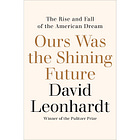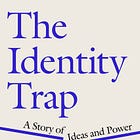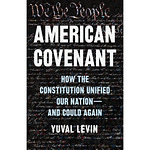This is the fifth and final post about The Spirit of Our Politics: Spiritual Formation and the Renovation of Public Life by Michael Wear, which was released Jan. 23. The first post on why I featured this book is here. The second post — on how a Christian politics is not simply having the right views — is here. The third post — on how a Christian politics is not about self-expression or winning — is here. The fourth post — on how a Christian politics is about who we are and who we are becoming — is here. If you want to see a schedule of every book I'm going deep on this year, one a month, I explained that here.
This past weekend, I was invited to speak at an Episcopal church in Northwest D.C., in between their 9 and 11 a.m. services.
The topic was my book Testimony, a memoir of growing up evangelical, becoming a journalist, and navigating the intersection of faith, family, politics and Trump over the last decade. When I spoke to one of the church pastors ahead of time, we discussed how to make sense of evangelical support for Trump, and how to bridge the relational gaps and fissures that have been created in recent years.
However. As I spent some time thinking about what I wanted to say, I couldn't escape the feeling that something more was needed. I can recount the errors of the Religious Right and Trumpism in my sleep at this point. I have spent years thinking, reading, talking about this.
Truth-telling and accountability will always be important. But I felt a hunger to avoid the mistakes of the last several years, as Beth Moore and Lore Wilbert have both articulated lately with great eloquence.
And as I compiled my list of how evangelicals came to support Trump, I found myself asking, "Could I compile a list of similar depth and breadth that critiques those on the left?"

I don't mean to equate the two: Trumpism and the left. But I also don't think it's worth avoiding the exercise just because we're worried about false equivalence.
That's something I picked up from Michael Wear.
I was asking this question of myself, in some part, because of my conversation with Michael about his new book The Spirit of Our Politics. When I read back over Chapter 3, I struggled with the way he critiqued Christians who have a more liberal theology or a more mystical approach to faith. I wrote about this in my second post on the book. And you'll hear, in the podcast interview, my questions for him on this subject. And if the assertion is that a more liberal or mystical theology necessarily equates or leads to a life that is less faithful, or even to a faith practice in which "the supernatural is stripped out" (77), I still disagree with that.
But my exchange with Michael was a healthy kind of friction for me. I should also say, as an aside, that taking a month to go through this book gave me the time to a.) think about this section and wrestle with it, and b.) think about how to ask questions that would be constructive.
As I challenged Michael's argument, he said some things that illuminated my own biases in a few ways. I could see how conservatives elevate their views on politics to gospel truths, but I wasn't as quick to see how progressive Christians can do the same thing. And I could see how conservatives make excuses for themselves to condone unChristian political behavior, but my imagination was not as active when it came to thinking about how those on the left might do the same sometimes, making political victory such an ultimate goal that it eclipsed personal faithfulness in some settings.
So all of that prompted me to think about this list-making I was doing, cataloguing the sources of evangelical support for Trump, and its faults. I was also influenced by Michael's recommendation in his book to affirm those we disagree with, and to critique those whom we support or agree with.
But the other thing that led me to ask this question is the fact that over the last few months of 2023, I read three books (and then interviewed the authors), and each of them helped me to understand — in a way I hadn't before — how support for Trump was partly due to real failures on the part of Democrats over the past years and decades.
David Leonhardt, along with Ruy Teixeira and John Judis (from The Liberal Patriot), helped me grasp the real ways that the American dream has died for many working class families, and how many of these families voted Democratic until the party left them behind. And Yascha Mounk’s book The Identity Trap expertly explained how these same families now perceive the Democrats who left them behind economically to be, at the same time, lecturing them about which words they can and cannot use.
You can listen to my interviews with all three of those authors here:
And so, as I told the parishioners at church Sunday, if I do not actively seek to challenge where I am now, I will be in danger of doing the same thing as those on the right whom I now critique: being more politically captive than I am prophetic.
The Trumpist movement is a legitimate threat to democracy. The evangelical worship of Trump is idolatry, with no equal I can see (though Barack Obama did come in for plenty of hero worship, which I always found offputting). But I have spent years reading and thinking deeply about how to understand and explain and critique Trumpism. I have not spent the same amount of time looking at the left. I do not regret that. This is a matter of timing. And I think some of my energy, now, should be aimed at critiquing where I have come to be situated.
Thanks to Michael Wear, and the authors I name above, for helping me along the path of staying hungry, not satisfied, hopefully not calcified.













